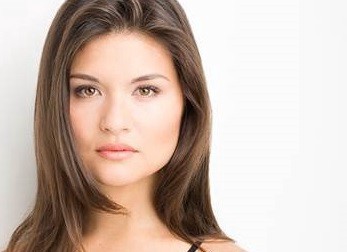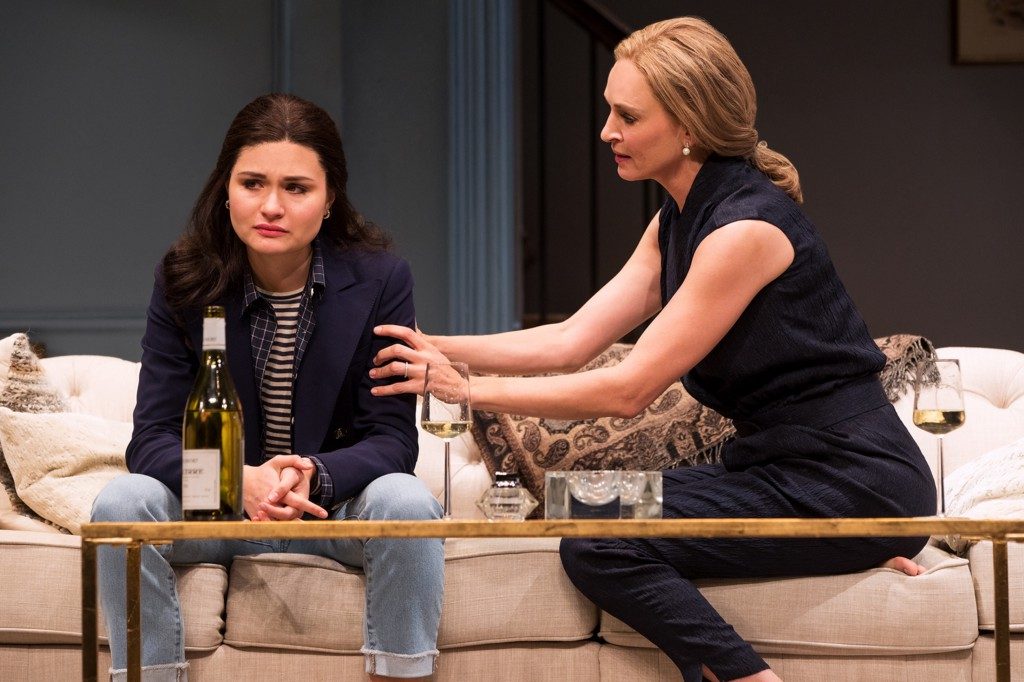
Phillipa Soo is no stranger to the Broadway stage. In the last few years, she has had leading roles in “Natasha, Pierre & the Great Comet of 1812,” “Hamilton,” and “Amélie.” The Julliard graduate, who primarily studied acting and not music, has a pivotal role in a new drama called “The Parisian Woman,” now playing at the Hudson Theatre. Written by “House of Cards” creator Beau Willimon and directed by Pam MacKinnon, the play also stars Uma Thurman and Blair Brown. It’s modern tale of politics, relationships, and scandals, and is painfully relatable to the times we are living in.
We spoke to Soo recently about what it’s like being in a politically charged show in 2017, her collaborations, and the #MeToo movement.
“The Parisian Woman” is now playing on Broadway.
W&H: What’s it like going from mainly musicals to a full-fledged drama?
PS: I had just come off doing three intense musicals that not only had songs but were almost completely sung through, so the idea of speaking words again felt fun and exciting — but there was a piece of my brain that said, “Can I still do this?”
There was an excitement and nervousness, but I had gone to school for theater and we did mostly plays and very little musical theater. So it felt like I was getting back to my roots in a way.
When I got into the room and started working again, I realized that with storytelling there are big differences in terms of the kind of work we are doing. But where it all comes from and where our intent is is mostly the same.
W&H: Did you audition for this show?
PS: I went in and read with Uma and for a couple of the producers. It was very clear to me that I wanted to be in the room with Pam again, [who directed me in “Amélie,”] and working on a play, [and especially] something that was contemporary [like this]. It all really felt like the right fit.
W&H: Did the political aspect appeal to you or frighten you?
PS: As an actor and the kind of actor that I want to be, when the outside world is really influencing the way that we want to approach the story, I’m always interested in that, especially with everything out there in the existing political climate.
It’s very clear to me that we need stories right now. We need stories that ask hard questions or make us laugh at ourselves or do both at the same time like our play does. Because how else are we going to examine ourselves and hold up a mirror up to ourselves and say, “What is society doing right now?”
Theater gives people a collective experience together in a room as opposed to us individually watching things on our televisions, computers, or on our phones. Having an experience together will change people — hopefully for the better — and hopefully that experience will shake them out of their minds and get them thinking beyond their everyday.
W&H: Tell me about Rebecca. Is she anything like you?
PS: Rebecca’s a lot like me in her idealism for her country. I drew from experience in the past year, just the idea of the young people in this country really wanting to make changes and seeing [what direction their country is headed in].
It was also eye-opening because I definitely wasn’t politically aware or politically savvy before. Under circumstances that I would have rather not have had, I became a much more informed person, but at least many of us chose to do that now. Otherwise we’re all living in ignorance.
W&H: I guess your education started with “Hamilton,” which drew a lot of attention, of course.
PS: It’s unfortunate that we are still so far behind. With things like “Hamilton” and the play I’m in now, we can strive towards a place we really want to see. A play like “Hamilton” was an extremely hopeful time for all of us. For them in that time, in “Hamilton,” the constituents, it was an extremely dangerous and violent time. We can see that now, and the hope is that the pendulum will swing the other way. We have to work towards that.
W&H: How did you prepare for the role in “The Parisian Woman” and what were rehearsals like?
PS: Rehearsal was the most relaxed process I’ve ever had. I did a bit of factual dramaturgical research. I wanted to look into Rebecca’s experience at law school and the type of law she was studying, very basic questions. Also about culture in D.C., like do people really have parties where Democrats and Republicans are hanging out, does that really happen — [and the answer is] yes, it does.
Then I created and imagined as I went along. Sometimes you discover those things well into the run of the show.
W&H: What was it like working with Pam MacKinnon again? Describe your collaboration with her.
PS: Pam is great. She’s truly an actor’s director and understands the process. Our conversations are very much based in character and story. She has a great way of conducting a room and being there and being present, and at the same time, juggling all the balls that are in the air when it comes to putting on a show, especially on Broadway because you’re dealing with the commercial level and how you’re marketing the show at the same time. There’s a joyful curiosity to her that I discovered in “Amélie” that I’ve seen it in this show, too.
Pam is just a great person to have in the room. When you’re having a conversation, there’s nothing outside of the room that can be a distraction. And of course there is, but we never sensed that from her. It’s always been a meaningful collaboration.
W&H: Talk about working with Uma Thurman and Blair Brown.
PS: In rehearsal, we had such a mixture of different experiences in mediums in this business, and Uma was so great because she really just went for it and tried a bunch of things right off the bat, which I really admire because it took me out of my very inside-out way of looking at the script. It was really great — super playful and messy in a really good way, and that was how we built the show.
With Blair, she’s a legend in this town. She is also the real deal and one of the best actresses I think I’ve ever had the pleasure of working with. On top of that, I think she sees this business as her calling. She has a great head on her shoulders and never lets anything phase her. She’s also just so fun to be around. Being in the room with her makes me feel so lucky that I get to work with the best actors in the world.
W&H: We’re very much living in the #MeToo movement. Does that get discussed on set and what are your thoughts about it?
PS: I think that we can probably assume that it’s happening in any business or company or any workplace where there are men in power with very little women in power. We need to be very aware of what these gender dynamics are in the workplace because they’ve been deeply rooted into the way we exist forever.
And now the tides are turning. I’m in a play with three very strong women who I think would be glad to take over any Senate seats or any corporation or any socioeconomic or cultural situation. Women are here. We’re here to start running things. It’s been uneven for so long.
I think Jessica Chastain talks about this — how she’s not just playing a strong woman. Why do we have to define her character as a strong woman as opposed to assuming she’s strong because she’s a woman? That goes assumed when you talk about men, but not with women. That’s why I wanted to play Rebecca. These [characters] are women who don’t take anything for granted and don’t assume that they have to bow down to any social constructs that exist. They’re going to break the glass ceiling themselves.
The #MeToo movment is also so important not only for ourselves but for young women to feel like this is a given for them. We’re doing this work and this fight so that they don’t have to.






